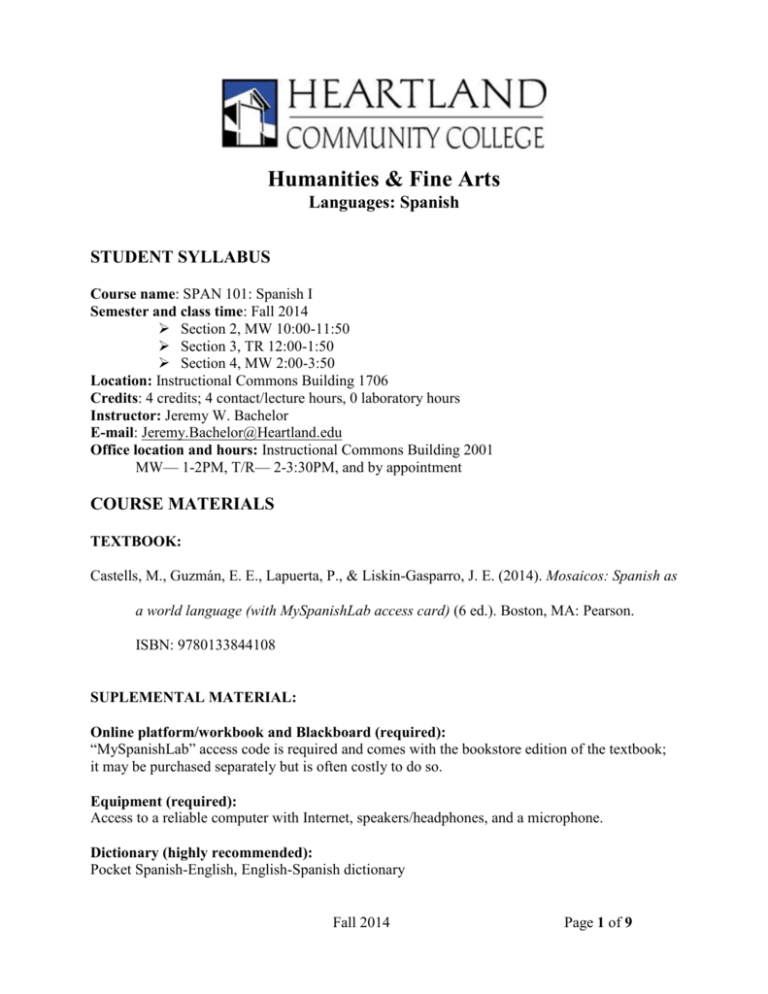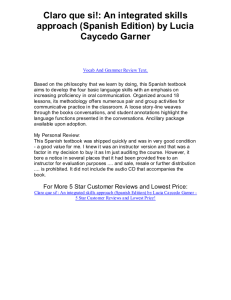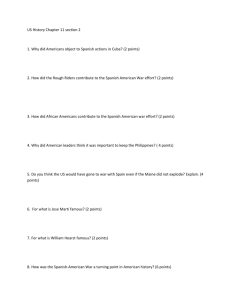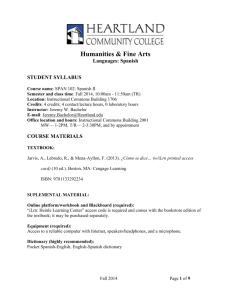notes to the syllabus - Heartland Community College
advertisement

Humanities & Fine Arts Languages: Spanish STUDENT SYLLABUS Course name: SPAN 101: Spanish I Semester and class time: Fall 2014 Section 2, MW 10:00-11:50 Section 3, TR 12:00-1:50 Section 4, MW 2:00-3:50 Location: Instructional Commons Building 1706 Credits: 4 credits; 4 contact/lecture hours, 0 laboratory hours Instructor: Jeremy W. Bachelor E-mail: Jeremy.Bachelor@Heartland.edu Office location and hours: Instructional Commons Building 2001 MW— 1-2PM, T/R— 2-3:30PM, and by appointment COURSE MATERIALS TEXTBOOK: Castells, M., Guzmán, E. E., Lapuerta, P., & Liskin-Gasparro, J. E. (2014). Mosaicos: Spanish as a world language (with MySpanishLab access card) (6 ed.). Boston, MA: Pearson. ISBN: 9780133844108 SUPLEMENTAL MATERIAL: Online platform/workbook and Blackboard (required): “MySpanishLab” access code is required and comes with the bookstore edition of the textbook; it may be purchased separately but is often costly to do so. Equipment (required): Access to a reliable computer with Internet, speakers/headphones, and a microphone. Dictionary (highly recommended): Pocket Spanish-English, English-Spanish dictionary Fall 2014 Page 1 of 9 CATALOG DESCRIPTION AND OVERVIEW Catalog: Spanish 101 is a beginning course in Spanish, with emphasis on the development of basic listening, speaking, reading, and writing skills. Course content includes basic vocabulary, essentials of Spanish grammar and syntax, correct pronunciation and intonation, and the use of actual speech patterns. Students with two or more years of high school Spanish should not enroll in SPAN 101. Overview: This is the first of two introductory courses for beginning students of Spanish. The objective of this sequence is to help students develop proficiency in the four language skills essential to effective communicative language learning and to offer an introduction to the culture of the ample Hispanic world. COURSE LEARNING OUTCOMES The following outcomes are expected of each student for this course. The general education learning outcomes are in parentheses. 1. Using entry level vocabulary and grammar concepts, the students will demonstrate understanding by using correct responses in oral and written interactions. (CO3) 2. Using entry level vocabulary and grammar concepts, the students will compose oral and written messages in Spanish. (CO1) 3. Using entry level vocabulary and grammar concepts, the students will identify beliefs, values and practices of the Spanish people: i.e. what they do, when, where and why they do it. (DI4) 4. Using entry level vocabulary and grammar concepts, the students will compare the uniqueness of the Spanish language to English. (CT1) 5. Using entry level vocabulary and grammar concepts, the students will identify the power of learning Spanish as they interact in the language within and without the school setting. (PS4) 6. Identify the characteristics of a successful Spanish student. (CO4) PREPARATION In order to meet the learning outcomes, the student is required to do pre-class preparation and exercises outside of class via the online MySpanishLab, to attend class regularly, and to participate fully in class activities. Class time will be primarily spent practicing communicative activities where students express their own ideas in Spanish. Students should follow the class schedule that is posted at the end of this syllabus. Class preparation is essential for ensuring a successful class period and effective communication for everyone. Spanish will be the primary language of instruction, and students are expected to use Spanish and avoid the use of English. Fall 2014 Page 2 of 9 METHOD OF EVALUATION AND GRADING SYSTEM 1. Written work – 80%, divided as follows: Written exercises (tareas escritas) – 10% Online homework – 20% Chapter tests – 30% Final exam – 20% 2. Oral work – 15% Oral exams 3. Personal growth & participation – 5% Grading scale 92 - 100 83 – 91 74 – 82 65 – 73 <65 A B C D F TESTS AND FINAL EXAM There will be one final exam and six chapter tests. The final exam is comprehensive and includes all class material. It will include grammar, vocabulary, reading, culture, and listening through chapter 5. The six chapter tests are non-cumulative. The chapter tests will assess listening, grammar, and vocabulary. Students must inform the instructor beforehand and arrange an alternative test time if they need to miss class due to an approved activity. For illnesses, make-up exams are not given unless the student has a doctor’s note excusing him/her from class. See the Notes to the Syllabus section for information on acceptable doctor’s notes. ORAL EXAMS There will be two formal oral exams which will consist of a short textbook-related role-play to be performed with a classmate in front of the instructor. More details about these exams and the rubric will be posted to Blackboard. WRITTEN EXERCISES There will be six written assignments during the semester, one for each chapter. These assignments are designed to help students practice their writing skills in Spanish and help them prepare for tests. At the end of the semester, the lowest scored written assignment will be dropped from the final grade calculation. Tareas escritas are to be turned in the following class session. They cannot be emailed to the instructor and must be hand-written. Fall 2014 Page 3 of 9 HOMEWORK AND ONLINE ACTIVITIES Daily homework for this class will be on MySpanishLab (www.MySpanishLab.com), the Online Learning Center that accompanies the textbook. All new textbook packages from the bookstore come with an access code to the online site. Students will be responsible for all assigned chapterrelated exercises on MySpanishLab. Once the student logs in (after registering), s/he should look at the course calendar to the right to see upcoming assigned exercises. All assignments can be seen by clicking on Assignments and then on the chapter. These assignments count for a grade! Most exercises online will be automatically graded and scored. Students will be able to submit responses as many times as they want until they reach a score with which they are satisfied. It is highly recommended to work on online exercises as material is covered in class. Online exercises will only be accessible during the time a chapter is covered. After the due date, exercises cannot be turned in for a grade. Students should not wait until the last day to begin working on homework. Since students have the entire duration of the chapter to work on the homework, those who have an excused absence on the day that the homework is due are not exempt from the deadline and do not receive an extension. For any technical problems with MySpanishLab, students should contact the technical support that they offer. Students should check the “Grades” section regularly to make sure answers are being properly recorded. If a student sees a problem, s/he should contact technical support immediately. It is the student’s responsibility to make sure s/he is receiving credit for the activities. The instructor will not accept excuses about issues regarding deadlines. On occasion, the site does not properly record speech. To avoid this, students should not wait until the due date and should contact technical support if the problem persists. PARTICIPATION, ATTENDANCE, AND PERSONAL GROWTH Participation in class will be assessed based on speaking only in Spanish, preparing for class, and actively contributing. Twice a semester (midterm and final), students will self-assess their own level of participation and personal growth. The instructor will take this assessment into account, but will make the final decision regarding the participation/personal growth grade. Students are expected to attend class regularly. Learning a foreign language happens by using the language with others. In-class activities are essential for learning. Therefore, the participation grade will be affected by absences and tardiness as follows: Every unexcused absence will result in a deduction of 5 points from the participation score. If students arrive up to 10 minutes late or leave class early, their participation grade will be deducted by 2 pts. It is the responsibility of the student to (1) inform the instructor of scheduled absences in advance, (2) when possible, and as soon as possible, provide a schedule of all semester absences, and (3) arrange to complete missed classroom work and/or exams. Excused absences are those that have been approved by the instructor upon provision of an official notification from a doctor or the College. See the Notes to the Syllabus section for information on doctor’s notes. Fall 2014 Page 4 of 9 WITHDRAWAL POLICY Students are expected to attend all classes and meaningful participate each day. Any student who does not make reasonable attempts to successfully complete all course activities may be withdrawn from the course at midterm. However, if any of the following situations apply, the student will be automatically withdrawn by the end of week 8: 1) 2) 3) was absent for any two consecutive weeks without appropriate notice, has more than five unexcused absences, and/or did not complete at least 60% of assignments. ACADEMIC INTEGRITY The following policy is in effect for this course: Academic integrity is a fundamental principle of collegial life at Heartland Community College and is essential to the credibility of the College’s education programs. Moreover, because grading may be competitive, students who misrepresent their academic work violate the rights of their fellow students. The College, therefore, views any act of academic dishonesty as a serious offense requiring disciplinary measures, including course failure, suspension, and even expulsion from the College. In addition, an act of academic dishonesty may have unforeseen effects far beyond any officially imposed penalties. Academic dishonesty includes, but is not limited to, plagiarism [including the use of online translators], cheating and falsification. Any student engaging in such practices will be subject to the following consequences, in part or in whole: 1. A failing grade on the test, project, assignment or course itself. This decision rests with the instructor teaching the class. 2. Incidents of academic dishonesty may be reported to the instructional chair and area dean or to the Vice President for Academic Affairs for further action, such as suspension or expulsion. 3. Any type of academic dishonesty may be internally documented. Multiple reports will result in referral to the Vice President of Academic Affairs. LATE POLICY No late papers/assignments will be accepted after the date and time stated in the syllabus or otherwise stated by the instructor. In extreme circumstances, exceptions may be made (i.e. hospitalization). However, this must be agreed upon by the student and instructor. Fall 2014 Page 5 of 9 COURSE OUTLINE (ORDER IS VARIABLE) Vocabulary relating to greetings, meals, eating out, classroom objects, family relations, daily activities, the house, colors, descriptive words, and states of mind Numbers up to ten thousand Spanish pronunciation and syntax Gender of nouns and forming plurals of nouns and adjectives Using definite and indefinite articles with nouns Agreement of the adjective with the noun The Spanish alphabet Use of the “tú” and “usted” forms Expressing “hay” to tell how many there are Using “tener” to expressing age and feelings Verb tenses: present and progressive Pronouns: subject, direct object, demonstrative, and with a preposition Using “gustar” Tell time, days, months, seasons, dates and holidays Use introductions and tell and ask personal data Asking questions with and without interrogative words Tell and ask needs, plans, wants, preferences and obligations Using “ir + a + infinitive” as a simple future Weather expressions Adjectives: possessive, descriptive, demonstrative and ordinal numbers Uses of “ser” and “estar” Making affirmative and negative expressions Comparing people and things Expressing possession with “de” Using the personal “a” and contractions Cultural topics such as the use of the formal and informal “you,” holidays, greetings, foods, meal times, the use of two last names, close family ties, the Hispanic world, Hispanics in the U.S, politeness, etc. RELATIONSHIP TO ACADEMIC DEVELOPMENT PROGRAMS SPAN 101 fulfills 4 semester hours of elective credit for the A.A., A.S. or A.A.S. degrees. It should transfer to most colleges and universities as an elective course. However, since it is not part of the General Education Core Curriculum described in the Illinois Articulation Initiative, students should check with an academic advisor for information about its transferability to other institutions. This course should articulate as the equivalent of an IAI baccalaureate major course; refer to the IAI web page for further information at www.itransfer.org. Fall 2014 Page 6 of 9 NOTES TO THE SYLLABUS Students are responsible for learning all new vocabulary and grammar, for studying the assigned materials, and for writing out assigned exercises before class time. If a student misses class, it is his/her responsibility to find out what material was covered during the absence and what assignments are due next class. Laptop computers and cellular telephones distract students from actively participating in a communicative environment and are therefore banned in the classroom. Tablets that are used in place of the textbook are exempt from this policy as long as the student only uses the tablet to access the textbook. No late assignments for anything aforementioned will be accepted unless the student has a doctor’s note or was previously excused from class. See below for important information on doctor’s notes. However, not even a doctor’s note will excuse students from the online homework. Blackboard will give students access to the syllabus (with the tentative calendar and test dates), handouts/instructions, announcements, Spanish tutor schedule (if arranged), and grades. MySpanishLab will be used only for completing online homework, viewing tutorials, and watching textbook videos. Students are expected to behave in a manner consistent with being in a professional environment. Open hostility, rudeness, and incivility are strongly discouraged and will result in appropriate action. Students acting in a disruptive or uncivil manner may be dismissed from the class for the remainder of the class period unexcused. Important information regarding doctor’s notes: Proof of a visit to the doctor/nurse will not excuse a student from class if the doctor/nurse does not specify that the student is to stay home. Simply visiting a doctor or nurse does not demonstrate that the student was not well enough to attend class. Doctor’s notes must be on official letterhead and signed and dated by the examining practitioner with a return to work/school date. Students are encouraged to seek help outside of class during instructor office hours for specific questions. However, the instructor will not re-teach lessons. Additionally, students are encouraged to form study groups and/or contact Tutoring Services to arrange for a Spanish tutor. Syllabus disclaimer: This syllabus is subject to modification. Students will be notified of any changes affecting them. Fall 2014 Page 7 of 9 SPAN 101: Tentative Schedule (subject to modification) Section 2, MW 10:00-11:50 Section 3, TR 12:00-1:50 Section 4, MW 2:00-3:50 Week 1, Aug. 18-21 Day 1 Class introduction, presentaciones, saludos y despedidas Day 2 El salón de clase, los meses del año y los días de la semana Week 2, Aug. 25-28 Day 1 El alfabeto, el tiempo, expresiones útiles Day 2 Singular forms of ser, cognates, estar + location Week 3, Sept. 2-4 Day 1 Day 2 Week 4, Sept. 8-11 Day 1 Day 2 No class for sections 2 and 4; Mosaicos cultural for section 3 Numbers, telling time, review Online homework due Sunday night before midnight Preliminar Test, los estudiantes y los cursos, la universidad las actividades de los estudiantes, pronunciación, present tense verbs Week 5, Sept. 15-18 Day 1 Articles and nouns, present tense of estar Day 2 Interrogative words, en acción, review Online homework due Sunday night before midnight Week 6, Sept. 22-25 Day 1 Chapter 1 Test, mis amigos y yo, las descripciones Day 2 El origen, Mosaicos cultural, pronunciación, adjectives Week 7, Sept. 29-Oct. 2 Day 1 Present tense of ser, ser and estar with adjectives Day 2 Possessive adjectives, gustar, en acción, review Online homework due Sunday night before midnight Week 8, Oct. 6-9 Day 1 Day 2 Oral exams Chapter 2 Test, las diversiones, los planes Week 9, Oct. 13-16 Day 1 La comida, Mosaicos cultural, pronunciación, hacer/poner/salir/traer/oír Day 2 Ir and ir a + infinitive, numbers Week 10, Oct. 20-23 Day 1 Saber and conocer, por and para Day 2 En acción, review, Online homework due Sunday night before midnight Fall 2014 Page 8 of 9 Week 11, Oct. 27-30 Day 1 Chapter 3 Test, los miembros de la familia, ¿qué hacen los parientes? Day 2 Las rutinas familiares, Mosaicos cultural, pronunciación, stem-changers Week 12, Nov. 3-6 Day 1 Day 2 Reflexive verbs and pronouns, tener que + infinitive Hace with expressions of time, en acción, review Online homework due Sunday night before midnight Week 13, Nov. 10-13 Day 1 Chapter 4 Test, ¿dónde vives?, la casa Day 2 Las tareas domésticas, Mosaicos cultural, pronunciación, progressives Week 14, Nov. 17-20 Day 1 Expressions with tener, direct objects Day 2 Demonstratives, en acción, review Online homework due Sunday night before midnight Week 15, Nov. 24-25 Day 1 Chapter 5 Test Day 2 No class Week 16, Dec. 1-4 Day 1 Day 2 Oral exams Final exam review Week 17, Dec. 8-12 – FINAL EXAM Section 2 10:00-11:50 am on Monday, December 8 Section 3 12:00-1:50 pm on Tuesday, December 9 Section 4 2:00-3:50 pm on Monday, December 8 Fall 2014 Page 9 of 9







